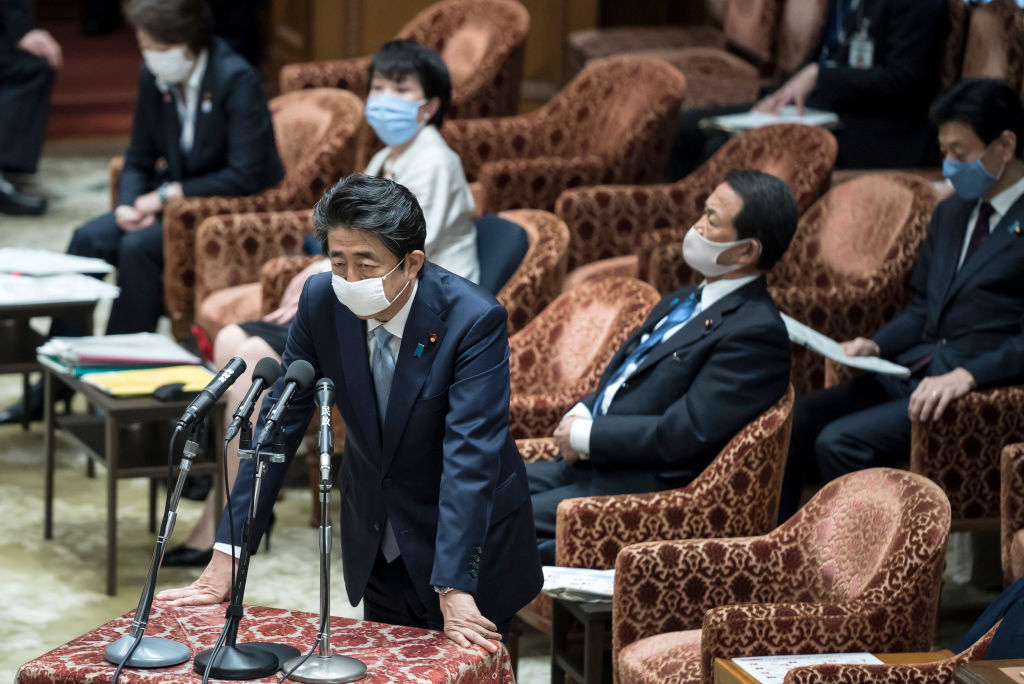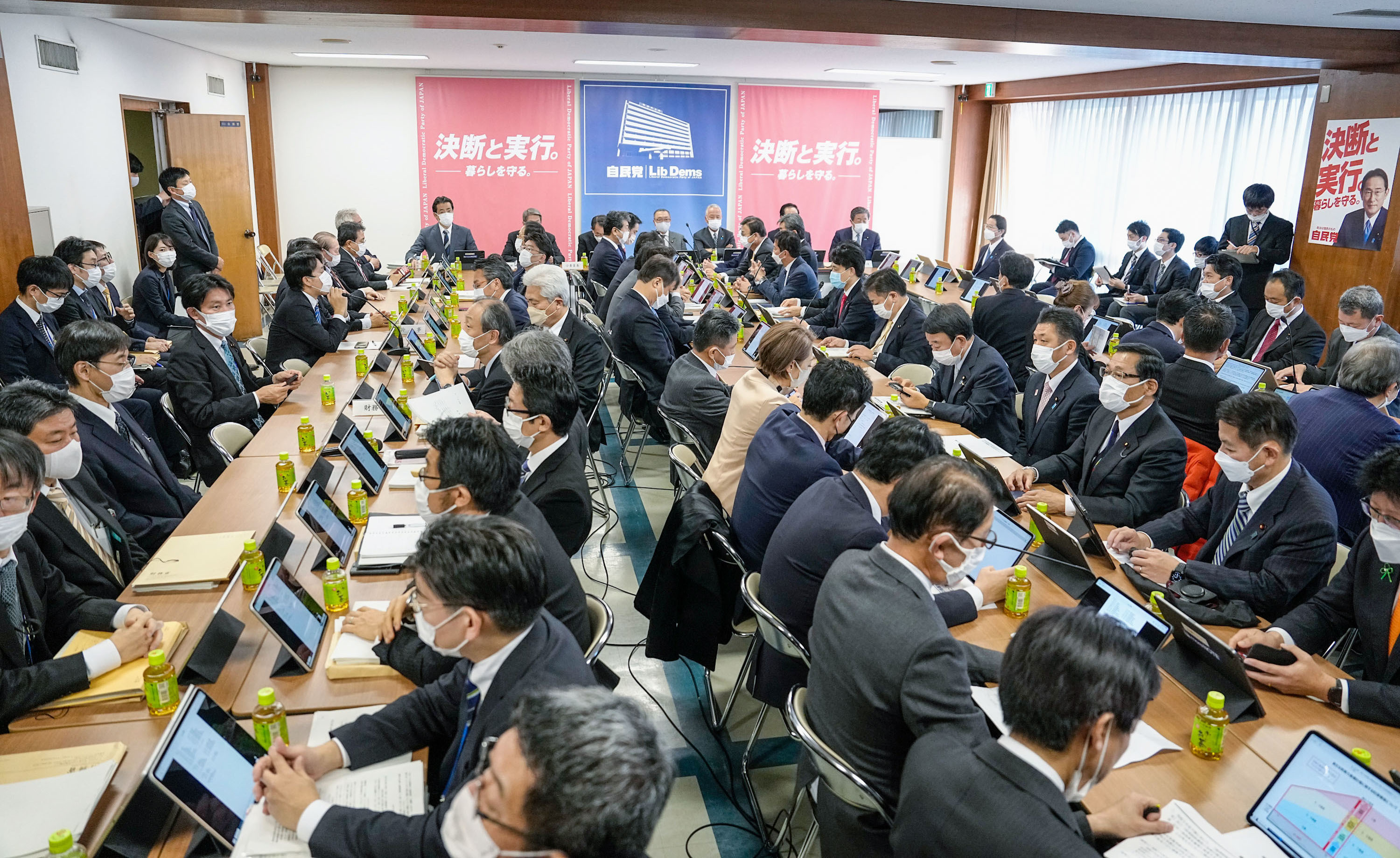
Shinzo Abe, who recently announced his resignation, was the only leader of a major industrial democracy to see his popularity decline following the coronavirus outbreak, despite the country’s low death rate. In an article originally published in the East Asia Forum Quarterly, Sota Kato and Iku Yoshimoto analyze the factors behind the phenomenon.
* * *
COVID-19 has spread quickly throughout the world, becoming a top policy priority for national and local governments. Populations have paid great attention to how national and local leaders have coped with the pandemic, and public judgments have significantly affected leaders’ approval ratings. Recently resigned Japanese prime minister Shinzo Abe faced falling approval ratings during the COVID-19 outbreak.
A glance at political leaders’ approval ratings in advanced democracies since the outbreak suggests that Japan stands out from the rest. Although Japan’s death rate from COVID-19 is among the lowest in the G7, along with South Korea and Australia, it is the only country in this group where the national leader’s approval rating declined.
The 2020 Edelman Trust Barometer Spring Update: Trust and the COVID-19 Pandemic reports a similar quirk in Japanese feelings about their government. Among 11 countries, including the G7 countries and South Korea, Japan was the only one where the public’s trust in its government declined between January and April 2020. These results are perplexing because Japan is home to the oldest population in the world, potentially making it the most vulnerable to COVID-19. The Oxford COVID-19 Government Response Tracker (OxCGRT) also shows that the Japanese government’s COVID-19 policy responses were among the least restrictive on people’s daily lives.
Why, then, did the Abe administration become so unpopular? There are a few possible explanations unrelated to its COVID-19 response. First, the administration was hit by a number of political scandals around the time of the COVID-19 outbreak. Second, Japanese citizens may believe that Japan’s relative success with COVID-19 is due to non-political factors, such as cultural practices and potential genetic factors. Still, considering the powerful impact of COVID-19 on people’s lives across the world, it is natural to assume that government responses would have a substantial effect on approval ratings in Japan as well as other countries.
Two hypotheses may help elucidate post-COVID-19 approval ratings of political leaders. The first is the idea of ‘retrospective voting’. It posits that voters will evaluate government performance by focusing on simple performance metrics, usually economic indicators such as disposable income, and vote for the incumbent party if those indicators improved while in office. Since COVID-19 has probably had a much stronger impact on voters than any other economic development since the outbreak began, retrospective voters would evaluate an incumbent’s performance by assessing how they fared with COVID-19. Simple metrics such as the death rate and infection rate are readily available. For Japan, the retrospective voting hypothesis may be made more complicated by the fact that the incumbent party is now without the leader who saw the country through a significant proportion of the pandemic.
The second hypothesis is the ‘rally round the flag’ effect. This is used to explain increasing support for a country’s political leaders during national crises, an historically observed phenomena.
But these theories might work in opposite directions in the case of COVID-19. If the number of deaths and infections is small, retrospective voting should lead to the positive evaluation of an administration, resulting in higher approval ratings. If this is the case, then the rally round the flag effect should be weak because of a lack of a sense of crisis among the public.
Current survey results in various countries do not seem to support the retrospective voting hypothesis. Japanese residents did not give the Abe administration credit for the low death and infection rates. Meanwhile, the approval ratings of political leaders in the United Kingdom, Italy and France significantly increased in the initial phase of the pandemic, even though the COVID-19 death rates in those countries were at the higher end among advanced democracies. Even more extreme examples are available at the local level: New York Governor Andrew Cuomo’s approval rating grew and reached 80 per cent at one point, despite New York’s being the most devastated by COVID-19 among US states. On the flip side, these results imply that the rally effect may have some validity.
It is still too early to conclude whether retrospective voting or the rally effect holds in COVID-19 politics. Since even public policy specialists have yet to reach a consensus on which national leaders have fared well against COVID-19, voters might need more time to retrospectively examine their leaders’ performances. Indeed, in countries like Germany and Austria, where death rates are consistently lower than other EU countries, approval ratings are steadily rising. The rally effect does not seem to be an enduring phenomenon either. For example, in the United States, although President Donald Trump’s approval rating jumped in the wake of COVID-19, it is now gradually declining.
If a political leader is to earn public support through the rally effect, he or she needs to show the public that he or she is the one holding the ‘flag’. To gain support from retrospective voters, a leader needs to be credited with responsibility for COVID-19 responses. Previous experimental studies on crisis management and leadership suggest that leaders can gain support by accepting responsibility, rather than deflecting blame.
In the case of COVID-19, local political leaders have been very active and visible in many countries, including Japan. Tokyo Governor Yuriko Koike and Osaka Governor Hirofumi Yoshimura have appeared on national television almost every day since the outbreak. They were quicker than Abe to explain the unfolding situation and urge citizens to take precautions. If the public perceives local leaders to be holding the ‘flag’, these leaders will be the beneficiaries of the rally effect.
Indeed, survey research undertaken by Nikkei in April showed that respondents evaluated the performances of Governors Koike and Yoshimura to be significantly higher than Abe’s. In Japan, the rally effect might have benefited local leaders rather than the then-prime minister.
This possible ‘battle for the flag’ phenomenon between national and local leaders is also present in the United States, where more data is available. Our statistical analysis shows that there appears to be a negative and significant correlation between Trump’s approval rating in a particular state and the approval rating of that state governor’s COVID-19 response, compared with pre-COVID popularity. For instance, in states where Trump’s approval rating is high, the public is less likely to evaluate their governor’s COVID-19 responses positively. The rally effect seems to have bolstered local leaders particularly where the president has been unpopular.
If Abe had played up the severity of the crisis Japan faced and enforced more vigorous measures to combat COVID-19, his approval rating would likely have been much higher. He could have seized the flag from local leaders and earned the rally effect seen in other democracies. Retrospective voting theory also seems not to have kicked in yet, as Japanese voters have not positively evaluated the Abe administration for low death and infection rates.
One can still argue that Abe did relatively well against COVID-19. Although his modest and gradual approach frustrated many as being indecisive, he might have adapted flexibly to Japan’s situation and minimised socioeconomic damage while maintaining low infection and death rates. The rally effect might be a short-term phenomenon and retrospective voting could turn out to be more significant in the long run. People may look back fondly on Abe and his administration if Japan maintains its low death and infection rates, but the jury is still out in judgment on Abe and other political leaders around the world.
Reprinted from the East Asia Forum Quarterly, July–September 2020.


